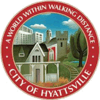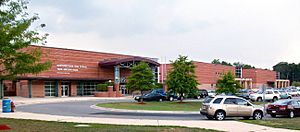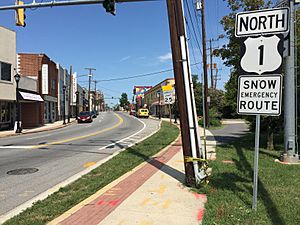Hyattsville, Maryland facts for kids
Quick facts for kids
Hyattsville, Maryland
|
|||
|---|---|---|---|
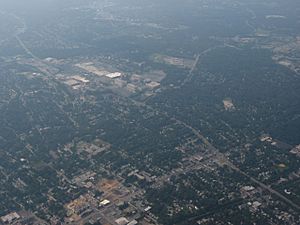
Aerial view of Hyattsville
|
|||
|
|||
| Nickname(s):
Hyattsville
|
|||
| Motto(s):
"A World Within Walking Distance"
|
|||
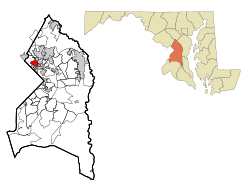
Location of Hyattsville in Maryland
|
|||
| Country | |||
| State | |||
| County | Prince George's | ||
| Incorporated | 1886 | ||
| Area | |||
| • Total | 2.73 sq mi (7.07 km2) | ||
| • Land | 2.71 sq mi (7.01 km2) | ||
| • Water | 0.03 sq mi (0.07 km2) | ||
| Elevation | 105 ft (32 m) | ||
| Population
(2020)
|
|||
| • Total | 21,187 | ||
| • Density | 7,832.53/sq mi (3,024.22/km2) | ||
| Time zone | UTC−5 (Eastern) | ||
| • Summer (DST) | UTC−4 (Eastern) | ||
| Area code(s) | 301, 240 | ||
| FIPS code | 24-41250 | ||
| GNIS feature ID | 0597595 | ||
| Website | www.hyattsville.org | ||
Hyattsville is a city in Prince George's County, Maryland, United States. It is a busy suburb located near Washington, D.C.. In 2020, about 21,187 people lived there.
Contents
History of Hyattsville
Before Europeans arrived, the area around the Anacostia River was home to the Nacotchtank people. They were a group of Algonquian peoples who spoke the Piscataway language. They lived throughout what is now the Washington, D.C., area. Sadly, European settlers brought new diseases. This caused many Nacotchtank people to die or move away. By the 1680s, most had joined other tribes.
In the 1720s, a man named John Beall bought land here. He started a small settlement called Beall Town. However, it did not grow as much as nearby Bladensburg. Things changed when the Washington–Baltimore Turnpike (now Route 1) opened in 1812. The B&O Railroad also built a line in 1835. These new routes brought more people to the area.
The city's founder was Christopher Clark Hyatt (1799–1884). He bought his first piece of land in 1845. Hyatt opened a store and started delivering mail. In 1859, he officially named the growing community "Hyattsville." This was when he applied to become the postmaster. After the Civil War, Hyatt and other landowners divided their land into smaller plots. They sold these plots, and Hyattsville's population grew. Hyattsville officially became a city on April 7, 1886.
Modern Growth and Development
Since the year 2000, Hyattsville has seen many new projects. There has been a lot of building for homes and shops. This includes the Arts District Hyattsville and the area around the Hyattsville Crossing station. The area near The Mall at Prince Georges has also grown.
The University Town Center is a big development. It has homes, student housing, offices, and shops. There is also a 14-screen movie theater and many restaurants. A campus of Prince George's Community College is also located here.
More homes and shops are being built near the West Hyattsville Metro station. Along Route 1, local businesses like craft brewers have helped make old buildings new again.
Geography and Climate
Hyattsville is made up of six main areas. These include Hyattsville Hills, Downtown Hyattsville, and University Hills. The historic part of Hyattsville includes Hyattsville Hills, Downtown Hyattsville, and Castle Manor.
The city covers about 2.70 square miles (7.0 square kilometers). Most of this is land, with a small amount of water.
Weather in Hyattsville
Hyattsville has a humid subtropical climate. This means it has hot, humid summers. Winters are usually cool to mild. The city gets a lot of rain throughout the year.
Population Information
| Historical population | |||
|---|---|---|---|
| Census | Pop. | %± | |
| 1880 | 288 | — | |
| 1890 | 1,509 | 424.0% | |
| 1900 | 1,222 | −19.0% | |
| 1910 | 1,917 | 56.9% | |
| 1920 | 2,675 | 39.5% | |
| 1930 | 4,264 | 59.4% | |
| 1940 | 6,575 | 54.2% | |
| 1950 | 12,308 | 87.2% | |
| 1960 | 15,168 | 23.2% | |
| 1970 | 14,998 | −1.1% | |
| 1980 | 12,709 | −15.3% | |
| 1990 | 13,864 | 9.1% | |
| 2000 | 14,733 | 6.3% | |
| 2010 | 17,557 | 19.2% | |
| 2020 | 21,187 | 20.7% | |
| U.S. Decennial Census | |||
The population of Hyattsville has grown a lot over the years. In 1880, there were only 288 people. By 2020, the population had grown to 21,187.
Population in 2020
In 2020, there were 21,187 people living in Hyattsville. The city has a diverse population. About 31.7% of residents were African American. Around 24.8% were White. About 3.7% were Asian. People of Hispanic or Latino background made up 38.6% of the population.
Population in 2010
In 2010, Hyattsville had 17,557 people. The population density was about 6,575 people per square mile. The city was made up of many different groups. About 35.6% were African American and 33.2% were White. Hispanic or Latino people made up 34.0% of the population. Many people from El Salvador, Mexico, and Guatemala lived in Hyattsville.
The average age in the city was 32.1 years. About 22.2% of residents were under 18 years old.
Economy
The National Center for Health Statistics has its main office in Hyattsville. This is part of the Department of Health and Human Services.
Arts and Culture
Historic Places
Hyattsville has many historic sites. Some are listed on the National Register of Historic Places. In 1982, a part of the city became the Hyattsville Historic District. This area was made larger in 2004.
The Hyattsville Historic District has beautiful Victorian houses from the late 1880s. It also has Sears bungalows and Arts & Crafts houses built between the 1910s and 1940s.
Important historic sites include the Hyattsville Armory and the Hyattsville Main Post Office.
Arts District
Downtown Hyattsville has been updated with the Arts District Hyattsville. This area has new townhomes, places where people can live and work, and shops.
Pyramid Atlantic Art Center is a non-profit arts center. It is located in a historic building in Hyattsville.
Public Libraries
The Prince George's County Memorial Library System (PGCMLS) runs the Hyattsville Branch Library. This was the first library building built by the county for PGCMLS in 1964. The original building had a cool, unique design with a flying saucer-style entrance.
Education
Public Schools
Several schools are located within Hyattsville. These include Hyattsville Elementary, Felegy Elementary, Hyattsville Middle, and Northwestern High School.
The city is served by Prince George's County Public Schools. Students in Hyattsville can attend:
- Hyattsville Elementary School
- Edward M. Felegy Elementary School
- Rosa Parks Elementary School
- University Park Elementary School
- Rogers Heights Elementary School
- Hyattsville Middle School
- Nicholas Orem Middle School
- William Wirt Middle School
- Northwestern High School
- Bladensburg High School
For many years, schools were separated by race. Black students from Hyattsville went to Lakeland High School until 1950. Then they went to Fairmont Heights High School until 1964. In 1964, schools were no longer separated by race.
Private Schools
- Chelsea School (grades 5–12) helps students with learning differences.
- DeMatha Catholic High School (grades 9–12) is a high school.
- St. Francis International School (Catholic) (grades K–8).
- St. Jerome Academy (Catholic) (Pre-K–8).
- St. Matthew's Parish Day School (Episcopal) (Pre-K–K).
Colleges and Universities
Prince George's Community College has a center in University Town Center. The University of Maryland campus is also very close. It is about two miles north of historic Hyattsville.
Transportation
Roads and Highways
Many important roads go through Hyattsville. U.S. Route 1 runs through the city center. It connects Hyattsville to Washington, D.C. to the south. To the north, it connects to Interstate 95 and Interstate 495. Maryland Route 410 also connects Hyattsville to other nearby towns.
Public Transportation
Hyattsville has two Metro stations: Hyattsville Crossing and West Hyattsville. The Riverdale MARC commuter train station is also nearby. There are also several bus routes, including Metrobus and TheBus. Students and staff at the University of Maryland can use a free bus called Shuttle–UM.
Bike Paths
Hyattsville is well-connected to a network of bike trails. These include the Northwest Branch Trail and the Rhode Island Avenue Trolley Trail. Many city streets have special markings for bikes. Capital Bikeshare also has eight bike rental stations in the city.
Law Enforcement
The Hyattsville City Police Department keeps the city safe. In 2017, they were the first police agency in the U.S. to use an all-electric police car. They have also added an electric police motorcycle. The city offers six free electric vehicle charging stations for public use.
Notable People
- Joanne C. Benson, a Maryland State Senator.
- Bill Butler, a former baseball pitcher.
- David Driskell, an artist and scholar.
- Markelle Fultz, an NBA basketball player.
- Parris Glendening, a former Maryland governor.
- Anne Healey, a member of the Maryland House of Delegates.
- Boris Kowerda, a Russian editor.
- Robert B. Luckey, a Marine Corps general.
- John C. Mather, a Nobel Prize winner in physics.
- Jamie McGonnigal, a voice actor.
- Paul Rabil, a professional lacrosse player.
- Dorothy Hope Smith, the artist who drew the famous Gerber Baby.
- Kameron Taylor, a basketball player.
- Frances Tiafoe, a professional tennis player.
- Chase Young, an American football player.
See also
 In Spanish: Hyattsville (Maryland) para niños
In Spanish: Hyattsville (Maryland) para niños



